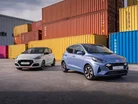Hyundai Invests US$16.6bn in EVs and Hydrogen Innovation

Global automotive powerhouse Hyundai Motor Group has announced an unprecedented US$16.6bn investment to drive the development of EVs and hydrogen-fueled products. The strategic move by the South Korea-headquartered company, ranked third in global vehicle sales behind Toyota Motor and Volkswagen, reflects a sharp focus on sustainability and innovation.
The plan includes a 19% boost in domestic investment as Hyundai aims to secure long-term growth amidst what it describes as a global “crisis.” The term likely references mounting economic and political challenges worldwide.
Where is the Money Going?
The record-breaking investment is divided into three key areas:
- Research & development: Hyundai is allocating US$7.84bn to advance next-generation technologies. These
include electrification, software-defined vehicles, hydrogen-powered solutions and autonomous driving systems.
- Production line adjustments: A further US$8.18bn will be spent on reconfiguring production lines to accommodate EVs and new models, ensuring scalability and efficiency for the growing global EV demand.
- Strategic investments: Approximately US$545m will focus on strategic initiatives like autonomous driving capabilities and other cutting-edge technologies.
“Continuous and stable investments are essential to overcome the crisis and secure future growth engines in the face of growing uncertainties,” the company stated.
Navigating a challenging political landscape
Hyundai's announcement comes at a time of significant political and economic volatility, both domestically and internationally.
In South Korea, political turmoil, including President Yoon Suk Yeol's declaration of martial law and subsequent impeachment, has created an atmosphere of uncertainty. Internationally, the US. The Inflation Reduction Act has provided opportunities for automakers to leverage tax credits for domestically produced EVs, while President-elect Donald Trump’s tariff threats have added additional layers of complexity.
To mitigate these risks, Hyundai began production at its new factory in Georgia, USA, last year, ensuring its vehicles qualify for U.S. tax incentives.
Industry insight: Preparing for the future
Industry analysts view Hyundai’s investment as a bold step toward securing its position in the global automotive market.
Nish Liyanage, Sales Director at Terrapinn, commented on LinkedIn:
“Hyundai Motor Company's record US$16.7bn investment in South Korea showcases its commitment to leading the EV revolution and overcoming global challenges.
“With plans to enhance EV production, advance autonomous driving technology and expand R&D, the world’s third-largest automaker is setting the stage for a more sustainable future.”
Liyanage highlighted Hyundai’s adaptability, noting its efforts to localise production in the US and explore digital sales channels like Amazon. “Its vision to streamline online car sales and reduce purchase time to 15 minutes reflects a bold approach to automotive retail,” he added.
Hyundai in numbers
Hyundai Motor Group’s impressive 2023 financial performance highlights its resilience and growth. Key metrics include:
- Sales Revenue: US$110.8bn
- Operating Profit: US$10.3bn
- Total Assets: US$192.5bn
Globally, Hyundai’s best-selling models for 2023 were:
- Tucson: 656,867 units sold
- Elantra: 401,894 units sold
- Creta: 327,625 units sold
- i10: 323,657 units sold
- Kona: 279,862 units sold
Building a sustainable legacy
Hyundai Motor Group’s record-breaking investment sets the stage for transformative innovation in EVs and hydrogen technology. By prioritizing sustainability and adaptability, the company is positioning itself to lead the global transition to a zero-carbon automotive future.
“Hyundai Motor Company's record US$16.7bn investment in South Korea showcases its commitment to leading the EV revolution and overcoming global challenges.
“With plans to enhance EV production, advance autonomous driving technology and expand R&D, the world’s third-largest automaker is setting the stage for a more sustainable future.
Nish added: “As Hyundai braces for geopolitical pressures, including potential US tariffs, it’s leveraging opportunities like the Inflation Reduction Act, making its EVs eligible for tax credits.
“Localizing production in the US, Hyundai's key market and exploring digital sales channels like Amazon further highlight its adaptability and innovative edge.”
He said the strategic shift addresses sluggish domestic demand and positions Hyundai to compete globally with low-cost rivals, adding: “Its vision to streamline online car sales and reduce purchase time to 15 minutes reflects a bold approach to automotive retail.”
Explore the latest edition of EV Magazine and be part of the conversation at our global conference series, Sustainability LIVE and Manufacturing LIVE
Discover all our upcoming events and secure your tickets today
EV Magazine is a BizClik brand


